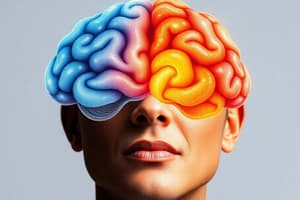Podcast
Questions and Answers
What is the primary focus of Personal Development in understanding oneself during adolescence?
What is the primary focus of Personal Development in understanding oneself during adolescence?
- Social interactions and friendships
- Physical health and fitness
- Academic achievements and performance
- Emotional growth and self-awareness (correct)
Which developmental stage is primarily examined in personal development education?
Which developmental stage is primarily examined in personal development education?
- Senior Years
- Childhood Stage
- Early Adulthood
- Middle and Late Adolescence (correct)
What is a key component of understanding oneself during adolescence?
What is a key component of understanding oneself during adolescence?
- Forming a consistent identity (correct)
- Adapting to peer pressure
- Maximizing academic potential
- Achieving social popularity
During which period do individuals typically experience significant self-discovery?
During which period do individuals typically experience significant self-discovery?
Which aspect is NOT a focus in understanding oneself during adolescence?
Which aspect is NOT a focus in understanding oneself during adolescence?
Flashcards
Middle Adolescence
Middle Adolescence
The developmental stage between ages 14-17 characterized by significant physical, emotional, and social changes.
Late Adolescence
Late Adolescence
The developmental stage from ages 18-24, where individuals prepare for adulthood and identity solidification.
Self-Understanding
Self-Understanding
The process of recognizing one’s own emotions, values, and personal strengths during adolescence.
Developmental Stages
Developmental Stages
Signup and view all the flashcards
Identity Formation
Identity Formation
Signup and view all the flashcards
Study Notes
Personal Development - Lesson 1: Knowing and Understanding Oneself
- Ideal Self: The self you aspire to be, mirroring a mentor or admired figure.
- Actual Self: The self you perceive, encompassing your characteristics and how others see you. It includes your thoughts, feelings, appearance, and actions.
- Self-Concept: Your awareness of yourself, integrating the actual and ideal self to form self-perception.
Personal Development - Lesson 2: The Power Triad (Thoughts, Feelings, and Actions)
- Thoughts: Internal summaries or predictions about situations or events.
- Feelings: Internal emotional states described by words like nervous, scared, or excited.
- Behaviors: Actions, both internal (e.g., muscle tension) and external (e.g., reactions), stemming from thoughts and feelings.
- Cycle: Thoughts trigger feelings, which influence behaviors. These behaviors, in turn, impact the situation and begin the cycle again.
Personal Development - Lesson 2: Knowing and Understanding Oneself - The Power Triad (cont.)
- Thoughts, Feelings, and Actions: This dynamic process shapes responses to situations.
- Negative Thoughts/Feelings: Can lead to unproductive or detrimental behaviors.
- Positive Thoughts/Feelings: Guide toward healthier behaviors.
Personal Development - Lesson 3: Developmental Stages in Middle and Late Adolescence (cont.)
- Developmental Stages: Prenatal, Infancy, Early Childhood, Late Childhood, Adolescence, Early Adulthood, Middle Adulthood, and Late Maturity are all stages encompassing characteristic stages in human development.
Havighurst's Developmental Tasks Theory
- Tasks: Typical developmental challenges for individuals. Success leads to personal satisfaction and community approval.
- Factors: Individual biology (physiological maturation and genes), personal psychology, and societal/cultural contexts.
Havighurst Developmental Tasks - Summary Table
- Infancy and Early Childhood (0-5): Learning basic skills and social roles.
- Middle Childhood (6-12): Master fundamental skills in reading, writing, and math.
- Adolescence (13-18): Achieving emotional independence, preparing for relationships and careers.
Studying That Suits You
Use AI to generate personalized quizzes and flashcards to suit your learning preferences.




